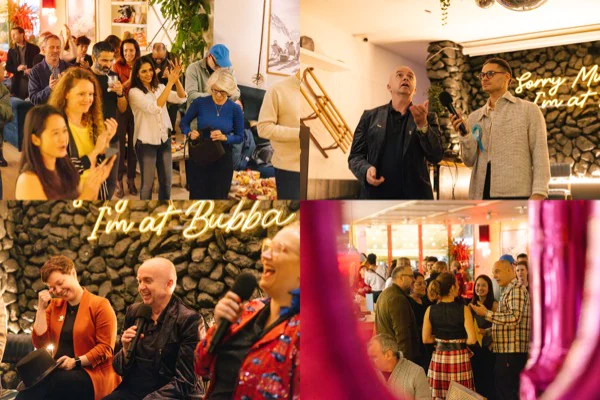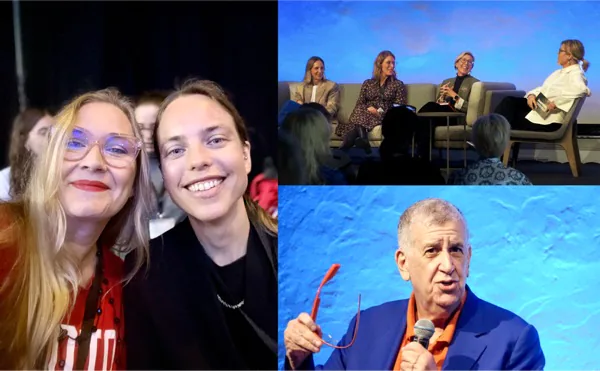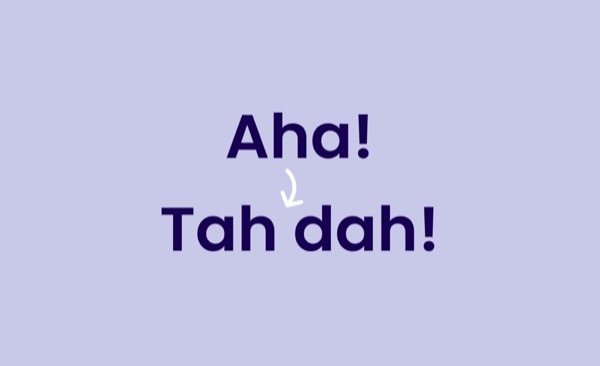What Makes an Organisation a Learning Organisation?
What makes a good learning organisation and how do we harness a learning mindset? Rubens talks all things learning and development with Nathalie Trutmann - education, leadership, corporate healing and social impact specialist. (This conversation took place in 2020 over Zoom).

Nathalie has spent over 20 years in the learning space, the majority of her working life. She’s a former CEO of Hyper Island, now focused on innovation, transformation and education. She’s author of two books; we especially love Handbook for Young Dreamers because we advocate dreaming big!
It’s very important, for both individuals and organisations, to observe our automatic reaction to this moment [Covid], where there are many unknowns. We tend to replicate patterns that worked for us in the past. Unfortunately, they aren’t necessarily going to get us through this time…
Our first question to Nathalie: Where is your attention at this moment in time?
Nathalie
I’m focusing very strongly on finding a new passion. One where I can put all my energy and learn lots during this sacred time that we’re all having.
Rubens
Fantastic! We are indeed in this moment where we can learn, unlearn and relearn. Many organisations are having to look in, what I call, the true mirror. They’re looking in it trying to realise who they are as organisations and who they plan to be… I read something you said about using this moment to reprogram our minds, to have a beginner’s mindset. Can you share what you mean by that and why it’s important right now?
Nathalie
This moment is very special and very challenging because it took us all by surprise. There was no time to prepare. It caught us off guard and has provided us with this true mirror moment – both for organisations and for individuals. It shows us what we do and don’t have, what we’ve done and what’s yet to be done. It’s very important, both for individuals and organisations, to observe how our automatic reaction in this moment, where there are many unknowns, is to replicate patterns that worked for us in the past. Unfortunately, they aren’t necessarily going to get us through this time.
Good learning organisations are those that have already allowed their executives to learn and experiment. Ultimately, organisations don’t sell products or services… they are places where people make decisions. And the quality of those decisions correlates directly to the balance between arrogance and humbleness. While some organisations have focused on saving the world and being better people, other organisations have focused more on the reality that real people have both arrogance and humbleness, that we are both altruistic and selfish. Those organisations have created systems for people to show themselves as they truly are.
Right now, we all have the opportunity to show ourselves as we really are. We’re all in our homes so there’s more of that reality already, work facades have dropped. But the organisations that already had systems and practices in place – allowing people to bring that real self to work and helping them grow within the company – are better prepared for the moment we’re facing. In such organisations it’s more acceptable, or they’re more used to, sharing worries and fears, supporting each other. Other organisations are having to catch up.
The balance between arrogance and humbleness in the decisions we make is an important one. When you are very self confident, you have a high degree of arrogance and if you are very humble you probably have a high degree of insecurity. So, how do you balance those two and how do you promote the healthy attitude of a learner? In the mind of a beginner, there are infinite possibilities. In the expert’s mind, the possibilities are limited. I sense, and observe, that a lot of people want to have the right formula to navigate this moment. But instead, let’s create the right conditions to explore different formulas and see what may or may not work.
Many still rush to conclusions, instead of exploring different paths. But the conclusion might not be as simple as you think and it might not be a duplicate of what’s worked in the past.
.jpg)
Rubens
I think there’s lots of resistance to implementing something like that. So, how can we build this beginner’s mind, how do we start to build this mindset into a company?
Nathalie
It’s especially difficult for individuals to adopt such a mindset. We always want to see the end, to know the outcome of something. We tend to allocate time on productive endeavours – what kind of course can I enrol in, what qualification will I get? But what if we allowed ourselves to experiment with scenarios where we don’t know what the outcome will be? With the beginner’s mind, you have to allow yourself to do things that are seemingly unproductive.
Many years ago, a company I worked for was bought out. The leaders of the company told us everything would be resolved in one or two months. From that moment, we were all paralysed. We had to live from month to month and there was no money to spend – we were on hold waiting for decisions to be made. But the decisions took a whole year, not one or two months. I remember that many people spent a lot of time wondering and talking about it, speculating and hypothesising. At that time though, I thought, I’m going to do something I’ve always wanted to do – sailing.
So, I convinced two friends to get a sailboat with me. We bought a really cheap one that we thought just needed some paint and some curtains, and it would work ok. But none of us had ever sailed in our lives, ever! And it was fantastic… We spent the whole year reading about sailing, fixing the boat and learning how to sail. It wouldn’t take us around the world, but it took us around a little bay. The energy of this beginner’s mindset however, stepping into a completely new world, hanging out with sailors, listening to their stories and reading about people who had sailed round the world – the energy that this generated, was priceless. And it brought a better person back to the company. I wasn’t one of those who’d spent time worrying about what was and wasn’t going to happen. I had spent a year being really energised and enthusiastic, and infecting others with that. So, where can we begin right now?
For those of us who are working and have heavy workloads, it’s hard because we are doing the home load plus the work load. But if you can, have a wild dream of something that you think is impossible. It doesn’t matter what it is. Break it down like a puzzle and take the first step. And for those of us who aren’t working – also start something that really excites you, no matter how small. Just start it. It doesn’t matter what happens at the end of 6 months or a year, the important thing is to get into that enthusiastic, happy, childlike state where you’re not counting the days. And don’t hang onto the news every single day to see what happens. When restrictions finally lift you’ll have learned something new and time will have flown by. When I went back to work, I was a happy enthusiastic person, able to contribute to my teams, my family and my workplace with a different kind of energy.
Rubens
I sell magic: magic that transforms organisations. One of the big challenges is showing the difference between how you make money and how you work, and showing the importance of how you work. And how much how you work can benefit how you make money. But it’s a war to make such simple magic come true. How did you experience that while you were leading Hyper Island and other organisations?
Nathalie
It’s a huge challenge… When I was at HI, and before that, I tried to overcome scepticism with numbers and concepts. People needed these first. If I came in with creative ideas, they were disregarded very easily. But then I changed things. First I presented something very technical, very businesslike, very number-driven, so that I could show the impact on the business. Then with that scepticism out of the way, I had creative freedom!
Learning organisations already know that it’s important to invest in the growth of their people because it will directly impact their sales and business positively.
One classic example is shoe company, Zappos and their success at delivering happiness. What does happiness have to do with the shoe business?? It’s simple – the happier your employees are, the more committed and engaged they are. Zappos decided that they weren’t just selling shoes, they were making human connections. It didn’t matter what a customer was calling about, the task of whoever answered the phone was to make that moment magical for the customer. There’s a lot of stories of people calling and asking for movie theatre schedules or help with wedding arrangements! Because the Zappos team was so well trained to help with whatever that person needed and because what they wanted was an unforgettable moment for the customer – it made their company very special. People working for Zappos felt excited because they were allowed to go off script and create magic. As magicians already know, when you create magic for someone else, you’re also creating magic for yourself! I imagine, Rubens, that when you do tricks and you see somebody smiling, it brings a smile to your face too. This nurtures us. This keeps us going.
Rubens
Yes that’s true. And living in this time when the world is totally upside down can definitely open the minds of many people that were resistant to this approach before. But we also talked about new times creating a need for new habits – what habits do you think companies could incorporate now to build a learning-minded workplace?
Nathalie
It’s very important to review all the To Do lists that companies have. And what on those lists makes a difference to the experience of both the customers and the workforce. So many To Do’s… do we need so many?? Do we need to work extensive hours or could we lower the load a bit, do less and create space to listen to the sounds of the future? Everybody is wondering what’s going to happen next and how it’s going to happen, what is the new winning formula? Having endless tasks and To Do lists leaves people exhausted and stressed – it’s not enabling the mindset, creativity or imagination that we need. Somebody said that the first thing we lose in a crisis is imagination because it’s considered expensive and it’s not a time for creativity. Everybody’s in crisis mode and cutting costs. But how can we create thriving environments and good moments for people at work so that they’re still excited and enthusiastic?
Rubens
What comes to mind when thinking about things that stop or hinder companies from achieving a beginner’s mindset? You’ve worked with some great companies, from Oracle to Red Bull to Unilever – what gets in the way?
Nathalie
Abundance of financial resources get in the way! This is in Clayton Christensen’s great book – How Will You Measure Your Life. He said focus on smart money. This is when you have very few resources and you still make something happen. In big companies, the difficulty is that they’re used to creating big initiatives. They’re not comfortable with small initiatives because they compare them to the existing ways of doing business. Why is this important if we can only bill X, when we’re already billing much more with another scheme? Once again this highlights the fact that many companies only measure numbers. They’re not measuring the rate of learning that the initiative might have, or the increased rate of cohesion and collaboration in a team. If you allow more of these smaller experiments, you may not get the big bucks, but you will get a much higher rate of learning, bonding and collaboration between your team members. So I think an abundance of resources and always thinking in big terms can be an obstacle to a learning mindset.
The other thing that gets in the way is that we are very attached to having detailed road maps of where an experiment is going to take us. But look, nobody planned for this pandemic right? We forgot to plan for this! No plans that were set in place at the beginning of 2020 contemplated something like this. We should test initiatives and ideas without knowing where they’re going to take us, without judging them or throwing them out just because they don’t necessarily bring big money in. But what else can they bring, what can we learn? Can we learn something new about our employees, about our market, about our consumers? I think this is very important. So you can see how abundance of resources and attachment to knowing the outcome of an initiative can get in the way of learning?
Rubens
You’ve spent your life redefining learning… Let’s say you have a magic wand, how would you redefine learning again now?
Nathalie
More real-life project based learning? Learn something like how to build a boat or how to do science experiments. Remove the up front evaluation of right and wrong and think of initiatives where you measure learning by excitement, smiles and the sparkles in peoples’ eyes. When you lose those things, you lose the most precious things we have. So, if we can conjure learning like that, that would be great!
A big thank you to Nathalie for her time and thoughts on this subject. We hope you enjoyed reading our conversation as much as we enjoyed having it!
Let’s close with a final question: What’s one thing you’ve learned, relearned or unlearned since social isolation started?
- I’m re-learning to write code
- I learned how to peel an orange properly!
- I’m unlearning to structure my days
- I am learning how important it is to exercise
- I am unlearning to endlessly distract myself with random stuff
Curious?
Let’s talk
Have a project or collaboration in mind? Schedule a 20 minute discovery call with our experts and we can discuss your goals and how to help you get there.



